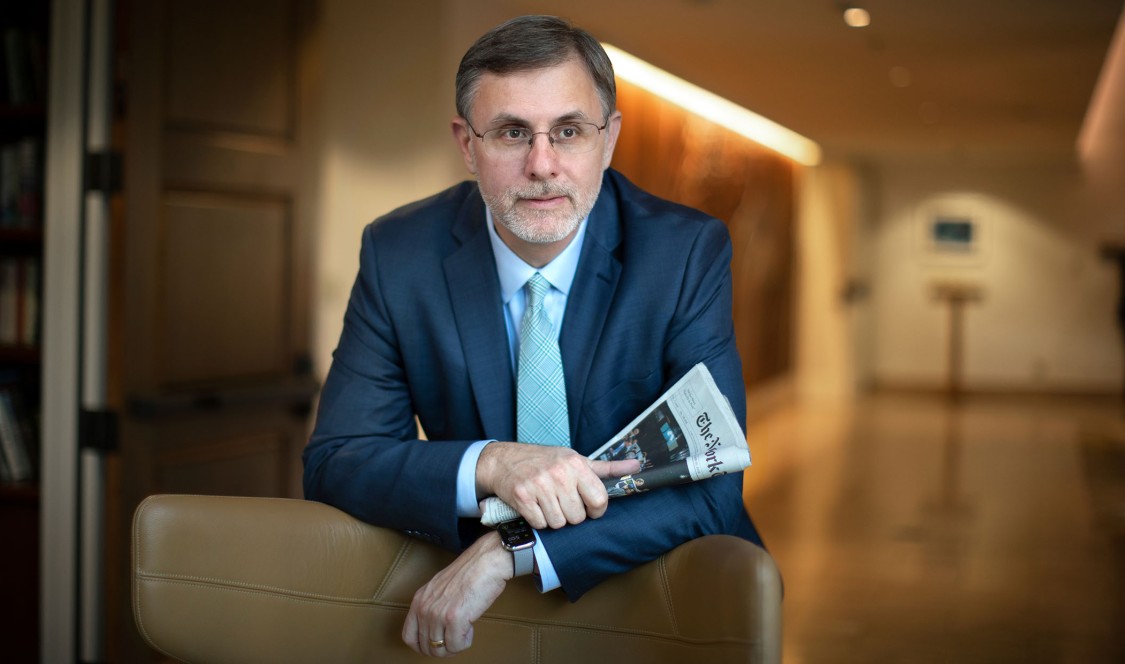Michael Shear ’90, a New York Times’ White House correspondent and two-time Pulitzer Prize-winning reporter, has covered three presidents, often traveling the world on Air Force One and getting a front-row seat as he reported on administrations including Presidents Barack Obama, Donald Trump, and Joe Biden. With so much changing in this unprecedented presidential election news cycle, Shear shares his experiences covering the White House for the past 16 years and how reporting expectations have changed.
What stands out to you most about your coverage of this election compared to past ones?
The most significant difference this year has been the abrupt end of the Biden campaign after his debate performance heightened concerns about his age and mental acuity. His decision to drop out of the race plunged the country, and political journalists, into uncharted territory. News organizations like The New York Times had to quickly pivot our coverage to the candidacy of Kamala Harris and a completely new set of comparisons between Harris and Trump.
Where were you when Joe Biden announced he would not seek a second term? Has any of this felt surreal, especially since summer?
I worked every day from the Biden-Trump debate until the Sunday morning that Biden announced that he was dropping out. I was at home in Washington, D.C., making calls to senior advisers on President Biden’s campaign, when the tweet went out announcing his decision. One of my colleagues texted our White House team group chat with a link to the statement: “Is this real?” That prompted a scurry to get up our pre-written story up about his decision.
How has election coverage changed since you first started covering the White House?
Election coverage has become supercharged over the last 16 years, largely by the increased use of social media as a source of political news. In 2007 and 2008, when I was first on the campaign trail, Twitter had just become a source of information, and we filed updates to stories that would appear on our newspaper websites. But now, the actual newspaper is something of an afterthought and online publishing is constant and 24-7. That shift—making online coverage the priority—has lots of implications for how candidates deliver their messages and how political reporters respond with coverage.
What is the most common misconception people make about the media’s coverage of this Presidential election?
There’s always a perception that journalists are on one side or the other of a presidential election. There are certainly examples of opinion-based journalists (think some MSNBC or Fox News hosts). But most traditional journalists view their jobs as holding politicians to account, regardless of which party they represent. That often means that journalists clash with the candidates they cover, but not because of an ideological preference.
How do you keep perspective about your job and not get swept up in the volatility or emotional back-and-forth of such a fast-moving election cycle?
It can be hard to be at the center of the political storm, but I like to compare it to the training that people in other occupations get to be ready for their busy periods. Emergency room doctors must be prepared for that moment when they are flooded with victims of a disaster. Police officers undergo training for protests or other confrontations with criminals. Judges work hard to be ready for high-profile, intense trials. In all of those cases, they must put aside their own personal feelings as they do their job in the moment. It’s the same with journalists. We work hard to be in a position to cover the news accurately, fairly, and independently regardless of whatever personal opinion we might hold.
Have you relied on anything from your CMC days to inform how you approach your professional role in such a polarized and contentious election?
I recall CMC being a place that required me to challenge my own assumptions, especially with students and professors who came from very different ideological backgrounds. That’s one of the keys to good political journalism—to understand that there are many different perspectives that you might not immediately think about, but that will be revealed by more reporting. If you let yourself be open to that possibility, your reporting can lead you to a better, more complete understanding of your subject.
What story are you most proud of and why?
Recently, I’m most proud of our aggressive coverage of Biden’s age, which began more than two years ago in the face of harsh criticism from the White House. My colleagues and I noticed Biden’s public decline and pushed hard in numerous stories to try and get the White House to reveal the impact of his health on his duties as president. Those stories, which included in-depth examinations of public and private observations, proved prescient after his debate performance in June. We followed them up with detailed, behind-the-scenes coverage of his decision to drop out of the race, including this story, He Still Thought He Could Win: Inside Biden’s Decision to Drop Out.

